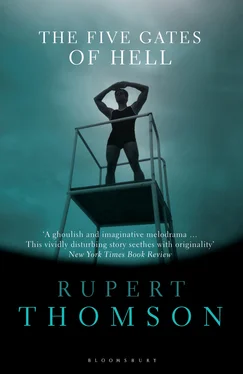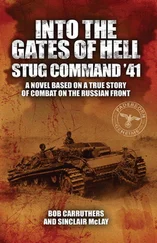Rupert Thomson - The Five Gates of Hell
Здесь есть возможность читать онлайн «Rupert Thomson - The Five Gates of Hell» весь текст электронной книги совершенно бесплатно (целиком полную версию без сокращений). В некоторых случаях можно слушать аудио, скачать через торрент в формате fb2 и присутствует краткое содержание. Год выпуска: 2012, Издательство: Bloomsbury UK, Жанр: Современная проза, на английском языке. Описание произведения, (предисловие) а так же отзывы посетителей доступны на портале библиотеки ЛибКат.
- Название:The Five Gates of Hell
- Автор:
- Издательство:Bloomsbury UK
- Жанр:
- Год:2012
- ISBN:нет данных
- Рейтинг книги:3 / 5. Голосов: 1
-
Избранное:Добавить в избранное
- Отзывы:
-
Ваша оценка:
- 60
- 1
- 2
- 3
- 4
- 5
The Five Gates of Hell: краткое содержание, описание и аннотация
Предлагаем к чтению аннотацию, описание, краткое содержание или предисловие (зависит от того, что написал сам автор книги «The Five Gates of Hell»). Если вы не нашли необходимую информацию о книге — напишите в комментариях, мы постараемся отыскать её.
The Five Gates of Hell — читать онлайн бесплатно полную книгу (весь текст) целиком
Ниже представлен текст книги, разбитый по страницам. Система сохранения места последней прочитанной страницы, позволяет с удобством читать онлайн бесплатно книгу «The Five Gates of Hell», без необходимости каждый раз заново искать на чём Вы остановились. Поставьте закладку, и сможете в любой момент перейти на страницу, на которой закончили чтение.
Интервал:
Закладка:
‘Nathan?’
He could tell it was long-distance, the line was so gravelly and hollow, but he didn’t recognise the voice. ‘Who’s this?’
‘It’s Georgia.’
Georgia? His eyes opened. This was unheard of, Georgia never called. He was about to make a joke about it when she said, ‘I don’t know how to say this.’ She sounded strict, almost officious. It took any jokes he might’ve made and threw them away.
‘I’ve never said it before.’ She paused. ‘My dad’s dead.’ She paused again. ‘Sorry, I don’t know why I said that. He’s your dad too.’
They were on the phone for an hour, not really speaking, a few words scattered among the silence. They were linked, that was the important thing. It was as if they were clinging to each other, and they couldn’t let go. If one of them hung up they’d be torn apart again, three thousand miles.
Afterwards he couldn’t move. Something lowered over him like glass, something seemed to be positioned between him and the world. He could see his room — the white walls, the shelf of shells, the ocean in the window — but they could’ve belonged to anyone, they meant nothing.
Then the crying came, surprising him. Came like a sudden gust of wind, banging doors in him, shaking him to his foundations. Later, he sat on the bed, his insides chilled, his throat raw. He tried to sleep, but sleep hid somewhere else. He switched the radio on, just for the company of voices. He thought maybe he’d make some soup. It seemed absurd, everything ordinary did, but he made it anyway. In the afternoon he ran through light rain to buy a plane ticket home.
An hour into the flight he noticed a woman in a black dress sitting across the aisle from him. She clutched a bouquet of flowers in both hands, and her lips moved constantly, as if in prayer. Then, as the plane began to circle above Moon Beach, her head drooped and tears fell into her lap. The stewardess tried to comfort her, but the woman waved her away without looking up. Nathan turned to the window. He had a curious feeling of release; other people had taken portions of his grief upon themselves, and they were expressing it on his behalf. He was feeling lighter and lighter with every second that passed. There was helium in his blood. He could’ve floated clean away. Was this how you were supposed to feel? Dad’s dead, he told himself, dead. The way you might pinch yourself to see if you were dreaming. But he felt nothing. Nothing except this lightness, this elation.
The plane banked, and he pressed his face against the cold window. The ocean tilted up to meet him, its dark surface studded with points of light that looked like constellations, fallen stars. The tourist sitting next to him asked him what they were. Nathan explained that the bright lights marked the boundaries of the ocean cemeteries. The lights that were fainter were memory buoys. They were the equivalent of tombstones on land: they marked the actual graves. While he was talking he noticed scratch-marks on the water, hundreds of white gashes, and suddenly the captain’s voice, crackling over the intercom, interrupted him. The ships they could see on the right side of the aircraft were returning from a rehearsal for the service of remembrance that was held on the ocean every year. Towards the end of the week, in case they hadn’t realised, a unique festival was due to take place in Moon Beach. It was known as the Day of the Dead.
Nathan leaned back in his seat. He hadn’t realised.
Of all the weeks to be flying into Moon Beach, he thought. Of all the times for Dad to die.
When he was young, it had been one of the days he most looked forward to. Yvonne would come and stay, and she’d always bring a fish with her, a huge fish freshly caught from the ocean, and she’d gut it on the kitchen table. Fish should be eaten, she said, because fish were the guardians of the soul, and she was so powerful in her belief that nobody dared to disagree. He remembered how the fish lay gaping on its bed of newspaper, the flesh dark-red and subtly ribbed where it was split in half, and Yvonne with her sleeves rolled back and her wrists dipped in blood that smelt of tin.
It was a day that abounded in peculiar traditions. Pass any candy store in the city and there’d be marzipan skulls and sugar fish and little white chocolate bones for 5 cents each. Pass any bakery and you’d see cakes slathered in blue icing, cakes sprinkled with sea-salt. If you made a Day of the Dead cake at home you always hid a coin in it, and the person who found it was supposed to live for ever. Once, when she was four, Georgia had swallowed the coin and almost choked. It was still one of her favourite stories about herself. In the afternoon there’d be costume parties. You dressed up as Lazarus or Frankenstein, or you went as one of your dead relations. Or, if you couldn’t think of anything else, you just wore something blue because that was the colour you went when you were buried at the bottom of the ocean. And everywhere there were bowls of candy and slices of special home-made Day of the Dead cake. He could still remember the taste of that blue icing. Nobody’s mother ever got it right. You always had to spit it out and shove it down the back of some chair.
Later, when it grew dark, a fleet of ships would set sail for the ocean cemeteries, and the remembrance service would be held. Lying awake in his room, he’d imagine the boats rocking and the priest’s voice pushed and pulled by the wind. And then, later still, after the boats had gone, the dead would rise from the ocean bed and walk on the water. They gathered the flowers that had been left as offerings, they blew the floating candles out. Smoke that smelt of churches poured from the wicks, drifted over the slowly heaving ocean, hid their feet. It was a night of strange occurrences. It was the night that everyone was Jesus.
The plane landed. He said goodbye to the tourist and wished him a pleasant stay. From the airport he took a train into the city. He travelled in the buffet car, leaning against the window with a drink. The track ran parallel to the South Coast Expressway, through land that was flat, a wasteground of weeds and shale. It was almost ten now, long after rush-hour, but the road was bright with cars. Southbound there were tailbacks for miles. Thousands drove in for the celebrations. All Friday night the streets would be packed with people dressed from head to toe in blue. Sometimes they painted their hands and faces too. Sometimes they dyed their hair. That was what you did in Moon Beach. Turned blue once a year. And then, sooner or later, you turned blue for ever.
Now they were racing through the inner-city suburbs on slick rails. Rialto, Euclid, Mangrove West. The eastbound helix coiled against the sky like a giant concrete snail. Beyond the tenement blocks and the shopping malls lay the ocean, a black cloak spread on the ground, a hem of white foam where the waves broke. The train pulled into Central Station and Nathan stepped down on to the platform with his case. Moon Beach Central had been built in the style of a temple. A floor of polished marble, a domed ceiling of gold mosaic. Footsteps merged with voices, merged and echoed, the air seemed to be filled with whispering, the sound of prayer. Nathan walked swiftly to the exit. He passed posters for funeral parlours and women shaking tins for God. Heat, such heat, even at ten o’clock at night. There was an old man from one of the doom societies. He was raving about Armageddon and the fires of hell. He had to keep breaking off so he could mop the sweat from his face and neck.
Nathan hailed a taxi on the front steps of the station. ‘The west shore,’ he told the driver. ‘Blenheim.’
The driver eyed his case. ‘You on vacation?’
‘I live here,’ Nathan said, then he corrected himself. ‘I grew up here.’
Читать дальшеИнтервал:
Закладка:
Похожие книги на «The Five Gates of Hell»
Представляем Вашему вниманию похожие книги на «The Five Gates of Hell» списком для выбора. Мы отобрали схожую по названию и смыслу литературу в надежде предоставить читателям больше вариантов отыскать новые, интересные, ещё непрочитанные произведения.
Обсуждение, отзывы о книге «The Five Gates of Hell» и просто собственные мнения читателей. Оставьте ваши комментарии, напишите, что Вы думаете о произведении, его смысле или главных героях. Укажите что конкретно понравилось, а что нет, и почему Вы так считаете.












